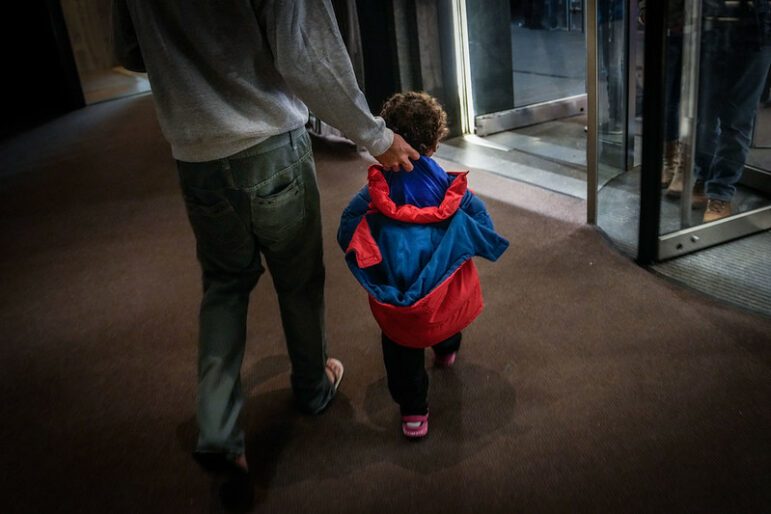The city pilot program called Promise NYC, which covered up to $700 a week in child care to undocumented children with low-income parents during the second half of 2023, will be continued and expanded in the city’s budget for the upcoming fiscal year, City Limits has learned.

Michael Appleton/Mayoral Photography Office
A child outside one of the city’s Humanitarian Emergency Response and Relief Centers for asylum seekers last fall.
Lea la versión en español aquí.
The city pilot program called Promise NYC, which covered up to $700 a week in child care to undocumented children with low-income parents during the second half of 2023, will be continued and expanded in the city’s budget for the upcoming fiscal year, City Limits has learned.
While the continuation will not be accompanied by the full $20 million that advocates and the four community-based organizations (CBOs) that implemented the program have pushed for, the $16 million allocated in the city’s newly announced $107 billion spending package is close enough for them to celebrate.
“While $16 million won’t be enough to satisfy the demand providers know exists, this investment will ensure that our immigrant families won’t be left high-and-dry,” said Immigration Committee Chair and Council Member Shahana Hanif.
The pilot, announced by Mayor Eric Adams late last year with an initial $10 million in funding, was intended to aid low-income families whose immigration status makes them ineligible for other federally-funded child care subsidies.
“This is a huge win, and it’s a huge win for children, and sends a reminder that regardless of papers, children deserve the right to childcare,” said Yesenia Mata, executive director at La Colmena, a nonprofit contracted to administer the program on Staten Island.
During a Council hearing on June 13, officials from the city’s Administration for Child Services (ACS), which is overseeing the childcare program, did not commit to renewing it in the year ahead, leaving participants fearful that the subsidy could abruptly end.
“I was dismayed when the administration couldn’t commit to Promise NYC funding for the upcoming year,” Hanif said Thursday. “But with today’s budget deal, New York City is ensuring that our undocumented neighbors will continue to have access to high-quality childcare.”
As of early June, 664 children were enrolled in Promise NYC—up from 320 kids in April—that exceeding the initial target of 600 when the program was launched late last year, Elizabeth Wolkomir, deputy commissioner of child and family well-being at the ACS, said during the earier Council. The vast majority of children enrolled, 75 percent, were under the age of 4.
The program has proven to be a life-changer for long-time immigrant families living in New York, as well as recently arrived asylum seekers, more than 50,000 of whom remain in the city’s care, officials have said, surpassing the number of longtime unhoused New Yorkers in shelter. During the last year, more than 70 percent of immigrants in the city’s shelters were families with children, according to recent City Hall data published by Gothamist.
Promise NYC has been especially transformative for single parents who have found jobs as a result of the program, giving them more freedom to study or pursue entrepreneurship. Several who spoke to City Limits this spring, some of whom were living in the city’s shelter system at the time, said having access to daycare helped their children receive better nutrition as well as early education and stimulation.
Demand for the program has been high since it was announced in December 2022; by March, some of the administering CBOs had waitlists with hundreds of people on it.
It’s not clear if families currently participating will have to reapply to the program, but the pilot is set to expire on June 31. When asked about the extension, ACS said it was not yet able to provide details.
“This is an essential program, and I’m deeply grateful to Speaker [Adrienne] Adams for ensuring it was not cut from this year’s budget and keeping our promise to immigrant neighbors that they are not left behind in our state’s historic expansion of early childcare,” Hanif said.








